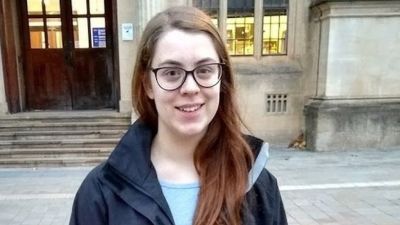Parents' anger as Bristol University appeals judgement over Natasha Abrahart's death

The parents of a student from Nottinghamshire who died whilst studying at Bristol University have criticised the institution for appealing a court ruling that it discriminated against her.
Natasha Abrahart, 20, took her own life on 30 April, 2018, after suffering from chronic Social Anxiety Disorder.
Last month, a senior judge at Bristol County Court found the university had breached the Equality Act 2010 in the way it treated Natasha, who had been studying physics.
The court found that assessing Natasha through verbal presentations could have contributed to a worsening of her Social Anxiety disorder.
A judge found the university had not made reasonable adjustments to the way it assessed Natasha.
He also ruled the institution had engaged in indirect disability discrimination, and had treated Natasha unfavourably because of the consequences of her disability.
In his ruling, he said, “it was accepted by the medical experts that the primary stressor and cause of Natasha’s depressive illness was oral assessment.”
Parents 'deeply disappointed' over university decision
Parents Robert and Margaret Abrahart have spoken of their disappointment regarding the university’s application to appeal the judgment.
Robert, aged 66 and a retired university lecturer, said that “It’s been a month since we called on the university to sit down with us so we could help it make the changes needed to keep students safe.
"We are deeply disappointed that the university is instead trying to re-run arguments which failed at trial.”
His wife Margaret agreed. “How much longer will we have to wait before the university apologises for what happened to Natasha?
"Even more importantly, how much longer is the university going to wait before implementing the lessons from Natasha’s death, which have been obvious for years now?
"At the trial the university couldn’t point to one meaningful change it had made to the systems which failed our daughter.
"It should be focusing on keeping students safe instead of dragging out this painful legal process.”
When life is difficult, Samaritans are here – day or night, 365 days a year. You can call them for free on 116 123, email them at jo@samaritans.org, or visit www.samaritans.org to find your nearest branch
Following the court's original judgement, a University of Bristol spokesperson said: “Our whole university community has been deeply affected by Natasha’s tragic death and we would once again like to extend our sympathies to her friends and family.
“Like all universities, schools and colleges, we are deeply concerned by the increase of mental health issues amongst our young people nationally. We do our very best to support any student who is struggling with their mental health and have a wide range of services available."
They added the School of Physics - where Natasha was studying - worked "incredibly hard and diligently" to support her.
"It was due to their efforts that she was receiving specialist mental health support from the NHS," they added.
"Our staff’s efforts also included offering alternative options for Natasha’s assessments to alleviate the anxiety she faced about presenting her laboratory findings to her peers. We are very grateful to them for their endeavours on Natasha’s behalf and for their unwavering commitment to our students.
“Alongside the support available, we have introduced an opt-in policy to alert a nominated contact when we have serious concerns about a student’s wellbeing and more robust procedures to assess students’ fitness to study. However, it is important that students receive appropriate specialist care under the NHS should they need it.
“We cannot replicate the NHS but are committed to working with the NHS and other partners to improve services and ensure we are collectively providing the best possible support for students."